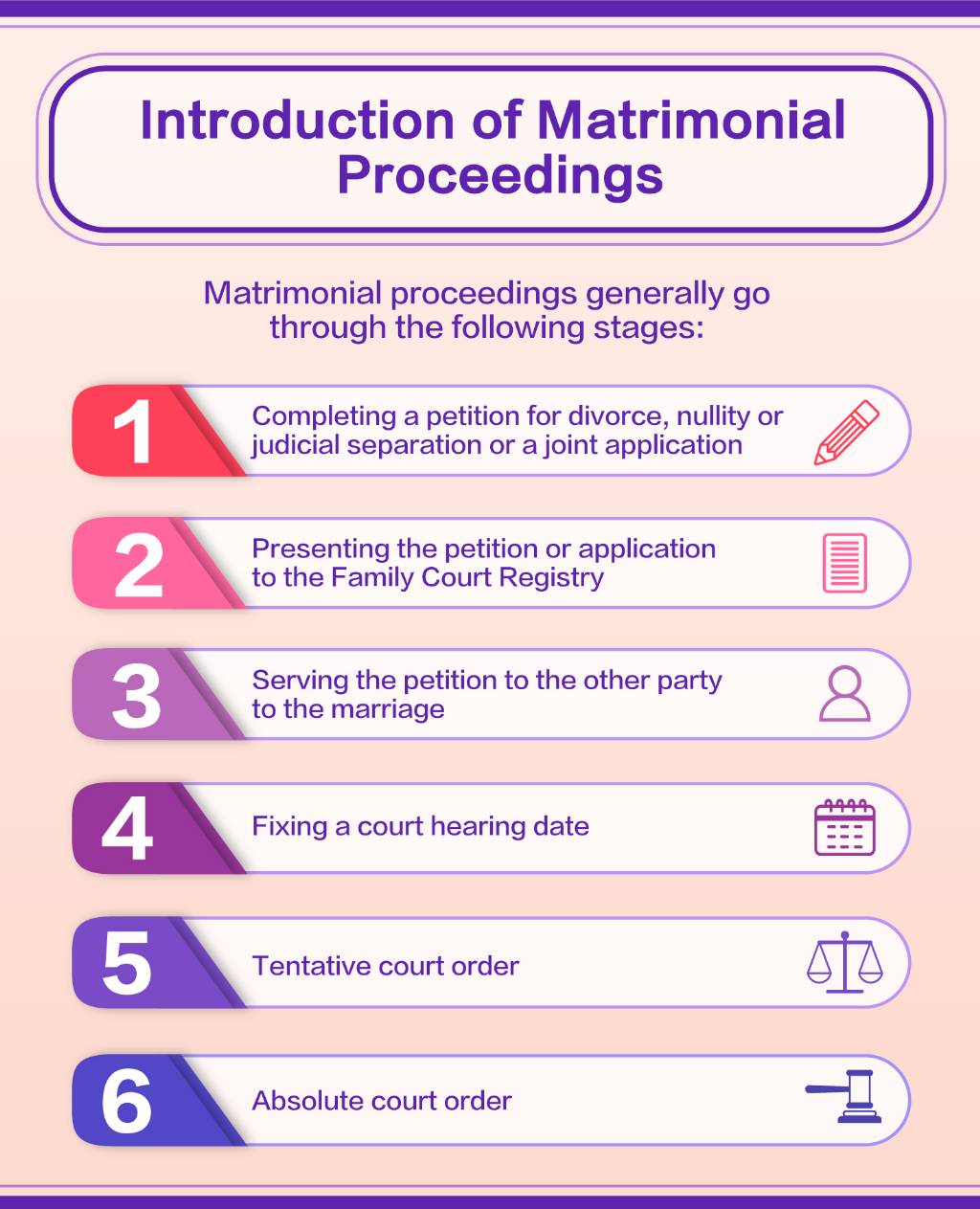Matrimonial Causes
When You are Troubled in Marriage
When you are troubled in marriage or before running into matrimonial proceedings, depending on the circumstances of both parties, you may consider counselling to discuss the issues and try to resolve conflicts.
Integrated Family Service Centres/Integrated Services Centres operated by the Social Welfare Department (SWD) and subvented non-governmental organisations, provide counselling service for individuals and families in need. For more relevant information, please click here.
When You Opt for a Divorce or other Matrimonial Causes
Matrimonial causes means any proceedings for
—
(a) divorce;
(b) nullity;
(c) judicial separation;
(d) presumption of death and dissolution of
marriage
Matrimonial causes are generally heard in the Family Court section of the District Court before a District Court judge and proceedings must be instituted either by a petition or by an application.
1. Divorce
Proceedings for divorce shall be instituted either —
(a) by a petition for divorce; or
(b) by an application for divorce.
Petition for divorce
A
petition for divorce may be presented to the court by either party to a
marriage, the court hearing a petition for divorce shall not hold the marriage
to have broken down irretrievably unless the petitioner satisfies the court of
one or more of the following reasons:
- that the spouse has committed adultery and the petitioner finds it intolerable to live with him/her;
- that the spouse has behaved in such a way that the petitioner cannot reasonably be expected to live with him/her, usually it is a series of misconducts or intolerable behaviors. However, a single incident of grave misconduct shall also be admitted by court;
- that the petitioner and spouse have lived apart for a continuous period of at least 1 year immediately preceding the presentation of the petition, and he/she consents to the divorce;
- that the petitioner and spouse have lived apart for a continuous period of at least 2 years immediately preceding the presentation of the petition (in such case the spouse’s consent to a divorce is not required); or
-
that the spouse has deserted the petitioner for a
continuous period of at least 1 year immediately preceding the presentation of
the petition.
Application for divorce
An
application for divorce shall be made to the court jointly by both parties to
the marriage. Both parties to the
marriage must prove to the court either or both of the following two facts:
- that the parties to the marriage have lived apart for a continuous period of at least 1 year immediately preceding the making of the application; and
- that not less than 1 year prior to the making of the application a notice signed by both parties of their intention to apply to the court to dissolve their marriage was given to the court and that the notice was not subsequently withdrawn.
During the proceedings for divorce, it is common that parties to the marriage will also address other issues related to custody and right of access, as well as ancillary relief such as maintenance, transfer of property, division of matrimonial assets, etc.
For more information and procedures about the proceedings for divorce, you can visit the website of the Judiciary.
2.Nullity

Either party to a marriage may present a petition to the District Court praying that his or her marriage may be declared null and void based on the following reasons.
a. A
marriage shall be void on any of the following grounds -
- that it
is not a valid marriage under section 27 of the Marriage Ordinance (Cap 181),
that is to say –
(i) the parties to the marriage are within the prohibited degrees of consanguinity or affinity;
(ii) either party is under the age of 16 at the time of the marriage; or
(iii) the parties have intermarried in disregard of certain requirements as to the formation of marriage; - that the marriage is otherwise invalid by the law of Hong Kong;
- that at the time of the marriage either party was already lawfully married; or
- that the parties are not respectively male and female.
b. A
marriage shall be voidable on any of the following grounds -
- that either
party –
(i) is incapable to consummate the marriage;
(ii) did not validly consent to it, whether in consequence of duress, mistake, unsoundness of mind or otherwise, at the time of the marriage; or
(iii) though capable of giving a valid consent at the time of the marriage, was suffering, whether continuously or intermittently, from mental disorder within the meaning of the Mental Health Ordinance (Cap. 136) of such a kind or to such extent as to be unfitted for marriage; - that the
respondent –
(i) willfully refused to consummate the marriage;
(ii) was suffering from venereal disease in a communicable form at the time of the marriage; or
(iii) was pregnant by some person other than the petitioner at the time of the marriage.
A decree of nullity granted on the ground that a marriage is voidable shall operate to annul the marriage only as respects any time after the decree has been made absolute, and the marriage shall, notwithstanding the decree, be treated as if it had existed up to that time.
3.Judicial separation

A petition for judicial separation may be presented to the District Court by either party to a marriage on the same grounds for instituting a petition for divorce.
Presumption of death and dissolution of marriage
Any married person who alleged that reasonable grounds exist for supposing that the other party to the marriage is dead may present a petition to the court to have it presumed that the other party is dead and to have the marriage dissolved.
The fact that for a period of 7 years or more the other party to the marriage has been continually absent from the petitioner and the petitioner has no reason to believe that the other party has been living within that time shall be evidence that the other party is dead.
Introduction of Matrimonial Proceedings

For the forms to be completed for presenting the relevant petitions or applications, you can visit the website of the Judiciary.
Seek Assistance
During the matrimonial proceedings, you may seek legal advice and assistance.
Free Legal Advice Scheme
The Scheme is managed by The Duty Lawyer Service. It gives preliminary legal advice to members of the public as to their legal position in genuine cases (including cases related to matrimonial causes) free of charge. The objective of the Scheme is to enable members of the public having genuine legal problems to have preliminary advice as to their legal position. However, the Scheme will not offer any follow up service nor legal representation to the applicants.
For more detailed information of the Free Legal Advice Scheme, you may visit the website of The Duty Lawyer Service.
How to apply
Members of the public wishing to seek free legal advice from the Scheme have to attend any of the designated appropriate referral agency, including the Integrated Family Service Centres of the Social Welfare Department, the Home Affairs Enquiry Centres, etc., to make an appointment to meet the volunteer lawyer at the Legal Advice Centres of his/her choice.
At the time of making the appointment, staff of the District Office will take down the detail background of the case of the applicant. The case paper will then be sent to The Duty Lawyer Service to vet and process. No appointment will be arranged for applicants who refuse to disclose details of their cases at the time of making appointment. On average an applicant should be able to meet a volunteer lawyer within six to eight weeks of making an appointment.
Service provided by the Legal Aid Department

Ordinary Legal Aid Scheme of the Legal Aid Department provides legal representation to eligible applicants in matrimonial causes. To successfully apply for legal aid, applicant must pass the merits test and the means test.
Means test refers to the requirement that the applicant’s financial resources do no exceed the financial eligibility limit. The current limit is HK$440,800. Merits test refers to the requirement that the applicant need to show that he/she has reasonable grounds for taking or defending proceedings.
For more information about the Ordinary Legal Aid Scheme, you may visit the website of the Legal Aid Department.
Sources: Department of Justice, Legal Aid Department, Social Welfare Department, The Duty Lawyer Service
